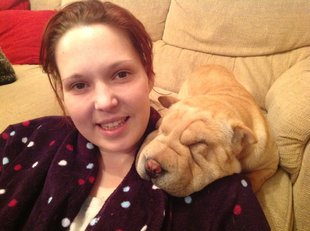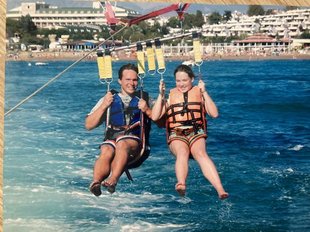Hannah's story - from a dad to a daughter

Hannah
"I would just hate any other young woman to have to go through this."
When did you first hear about ovarian cancer? For me, it was because of my daughter. I write this knowing it could have been you, your mother, your sister, your friend. Maybe you were lucky enough to get an early diagnosis, and unfortunately it is luck because there’s no screening tool so early diagnosis is scarce. Often, when people like us first discover it, it has advanced so aggressively that treatment is futile, we feel robbed. Who hears about ovarian cancer? Public awareness is low, but it needs to change because it’s torn thousands of families apart, including my own.
I first heard of ovarian cancer when I was in a hospital ward with my 18-year-old daughter Hannah. Away from the warmth and familiarity of our family home, I had to do the one thing no parent should ever be faced with: I had to tell my beautiful daughter that she was going to die.
For three years, Hannah was plagued by different tests and hospital visits with ongoing symptoms; stomach bloating and a severe lack of energy. This time though, by chance, Hannah was seen by a doctor who immediately sent her for an x-ray. It was only then that they realised the disease had spread through her vital organs. There was nothing more they could do.
You might have heard ovarian cancer referred to as “the silent killer.” But Hannah is proof that it’s not silent. People just aren’t listening.
Heartbreakingly, Hannah’s story isn’t the only one that ends in tragedy. In the UK, one woman dies every two hours from ovarian cancer. It breaks my heart to know that the average woman diagnosed with ovarian cancer has a higher chance of dying than surviving for more than five years. It is simply unacceptable.
Across the UK, women aren't being heard. Many medical professionals lack the understanding of the disease to diagnose their condition. Even in the face of an eventual diagnosis, treatment options are often limited and unreliable. My Hannah never stood a chance."
Back in 2013, Hannah shared her story with Ovarian Cancer Action and the feeling of not knowing over those three years.
“There were times when I would sit down on my mum’s bed and start crying. Mum would say – Hannah, what’s the matter? And I’d say ‘I don’t know, mum.’ I was really emotional and I didn’t know why. I just felt so ill and tired.
I hadn’t heard of ovarian cancer.
I was at work once and I felt really poorly so my friend and I googled and two things came up – ectopic pregnancy and ovarian cancer. I said right, it’s definitely not an ectopic pregnancy and it’s not going to be ovarian cancer.
I kept going to the doctors between the age of 19 and 20, and when I turned 21 that’s when I went to the doctor a lot because my symptoms got really bad. One doctor put it down to stress. Another gave me antidepressants. The walk-in centre said that it could be appendicitis. They would push down on my belly and say ‘everything feels alright’.
It feels like they didn’t take me seriously. Maybe if they had taken me a bit more seriously it would have been caught earlier and something could have been done.
A doctor told me that I had a urinary infection and he gave me two weeks of antibiotics. In the second week of taking them I received a letter saying I didn’t have an infection and if the pain continued I should go back. The pain came back so I saw a lady doctor, she checked my stomach and sent me immediately for an x-ray at the hospital, I was admitted that day and they started doing more tests. The doctors came to see me two days later and said that they had some important news but wanted to talk to my parents first.
My dad told me afterwards that it was cancer. We all thought that it was going to be curable. After a biopsy they realised that it was stage four ovarian cancer so I was going to have a full hysterectomy, I had just turned 21.
They stopped the operation as they found out that it had spread everywhere and there was actually nothing they could do. My dad had to tell me that I was going to die.
I’m not going to see my brother and sister grow up. I worry that they won’t have a picture of me in their head, because they’re too young to remember, so I’m making them memory boxes. I would just hate any other young woman to have to go through this.”
This isn't just for Hannah. It's for all women and their families.
While Hannah might not be here physically anymore, I’m still so proud to be her dad and that responsibility to her won’t ever stop. The sadness doesn’t go away either. But it has shifted to something that motivates me to make sure no one else faces losing someone so close to them through this disease. Our voices need to be heard.
A decade ago, Hannah desperately needed better tools to diagnose her disease and options to treat the cancer. I have often thought that if she was diagnosed today, the outcome might have been different. It breaks my heart to think of the thousands of other young women like Hannah who, if only they’d known the signs and symptoms, could still be with us.
I'm determined to put an end to the silence surrounding ovarian cancer. But, to make significant breakthroughs in the next decade, we need the continued support from individuals like you. For every Hannah and every woman diagnosed with ovarian cancer.

Jonathan, father of Hannah